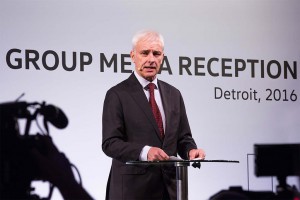
Volkswagen's Matthias Mueller outlined the automaker's plan to spend $8.8 billion to buy back cars with faulty diesels.
Not guilty.
Those are the findings of two separate investigations into the culpability of Volkswagen AG executives in the U.S. and Germany, according to the German automaker.
“Although the investigation by Jones Day is still ongoing, according to information currently available, no serious and manifest breaches of duty on the part of any serving or former members of the Board of Management have been established,” the maker noted in a release.
Jones Day is leading the investigation into Volkswagen’s diesel cheating scandal in the U.S. while the automaker hired law firm Gleiss Lutz in Germany, led by Professor Wulf Goette, a retired chief justice at the German Federal Court of Justice, to perform the same in Germany.
The automaker’s leaders have previously blamed “rogue” engineers for installing the software. The problem is expected to cost the German automaker at least $18 billion.
While VW announced the preliminary findings of both investigations, it noted that they were still ongoing. Additionally, it will not disclose details of the internal investigation until at least late 2016 due to concerns that making those details public could disrupt the criminal investigation ongoing at the U.S. Justice Department.

VW is shifting its focus to electric vehicles, like the T-Prime Concept GTE, which it claims to develop 375 horsepower and 516 pound-feet of torque.
(Volkswagen pushing ahead with Cross Blue production. For more, Click Here.)
German corporate law requires shareholders at the annual meeting to vote whether to ratify the previous year’s actions by the supervisory board, which represents investors and labor, as well as the management board, comprised of the company’s top executives, according to Bloomberg.
The affirmation of the board’s actions comes just a week after one of the company’s largest shareholders, TCI Fund Management, called for executive pay cuts. Additionally, the fact that VW’s top executives received bonuses – although significantly lower than normal – for 2015 earned them the ire of many.
German Economy Minister Sigmar Gabriel told reporters Wednesday that the bonuses are “appalling” and show “how far these people are removed from a sense of fairness,” Bloomberg reported.
(Click Here to see more about VW’s plans to meet with the UAW.)
In all, about 11 million vehicles sold around the world were equipped with a so-called “defeat device,” software designed to detect when a VW diesel was undergoing emissions tests and, if so, to adjust engine settings to reduce levels of smog-causing oxides of nitrogen.
VW sold almost 500,000 vehicles using a rigged 2.0-liter diesel engine in the U.S., as well as a smaller number of models with an illegally modified 3.0-liter turbodiesel. It last week offered a plan to a federal judge in San Francisco that would involve either buying back or fixing those vehicles and then offering compensation to owners.
VW executives have been offering repeated apologies related to the scandal and highlighted a newfound focus on EVs to help reassert the company’s position as a leader in green car technology.
(VW to spend $8.8 bil to repair or buy back rigged U.S. diesel vehicles. Click Here for the latest.)
VW plans to have 20 new battery-based models in its portfolio by 2020. It already has several on sale around the world, including fully electric versions of both the Golf and the smaller Up! In recent months, it has been offering hints of what else might be coming with concept vehicles like the Volkswagen T-Prime GTE that debuted at the Beijing Auto Show.
